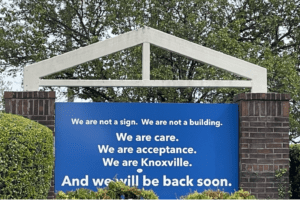Tennessee campus carry, present circumstances and the future
The controversial decision from Tennessee state legislators to allow faculty to carry firearms with a permit on campus is broken down and explained.

//Photo by Ryan McGill
Columbine, Virginia Tech and Sandy Hook are landmark incidents in the alarming trend of gun violence that has become all too common in this nation. Tragedies such as these have continued the debate on gun control with a divide of opinions as to whether the answer is guns in the hands of legal owners; or stricter laws making society safer.
As of the fall 2016 semester at the University of Tennessee in Knoxville, 130 faculty members that are permitted handgun carry holders have notified the University of Tennessee Police Department of their intent to concealed carry on campus.
Legislation that took effect this semester lifts the gun free zone within certain restraints on UT’s campus. Faculty who do not attend any classes at UT and have a valid carry permit are now allowed to conceal their firearms on campus. Outside a handful of limitations such as not carrying in meetings that discuss tenure or disciplinary actions, restricting carry into mental health facilities and the restriction to carry at certain locations during University sponsored events; otherwise there are few other inhibitions.
The law, SB2376, which passed on May 5, 2016 without Governor Bill Haslam’s signature, was rife with opposition from the very beginning.
One of the most outspoken faculty members in opposition to this bill is Bruce McLennan, Associate Professor of Electrical Engineering and Computer Science and President of the Faculty Senate.
“I’m not a law enforcement expert and I’m not an expert in these types of situations and when you talk to the people who are they say it just makes the situation worse,” McLennan said. “If you go into a situation and you’ve got an active shooter, and you’ve got other people there that also have weapons everyone with a weapon is considered the bad guy. It just makes the situation more confusing and potentially more dangerous for everybody.”
Among McLennan’s many concerns regarding this bill, he spoke about the loss of potential future faculty and student; “We don’t know how many people read this about Tennessee and say, ‘Well I’ll just scratch Tennessee off my list of places top apply.’”
McLennan clarified his opposition in a more precise context; “Few, if any, of the faculty are against the 2nd Amendment. We’ve got lots of NRA members, lots of hunters and lots of ex military. It’s not like we are all totally against guns in all contexts, but [campus] is just not a smart place to have them,” he said.
Numerous efforts on his part were made to inform his colleagues about the upcoming bill back as early as Feb.7. In an effort to try to enlighten people McLennan said, “One thing we can try and do is educate the populace.”
In a survey conducted by the Faculty Senate, of the 736 responses from faculty, roughly 87 percent of responders were against legislation allowing guns on campus. Among the numerous anonymous comments from those for and against this bill were many thoughtful explanations of both opinions.
State Senator Mike Bell, the primary sponsor of the bill, responded to the survey saying simply, “I think some of these people need to take their medication.” Bell goes on to say, “Well, maybe this will give UT a chance to higher some conservative teachers if we have a mass exodus of some of these liberals who responded to this!”
With some amount of exasperated levity, McLennan commented on Bell’s statement asking, “You’re saying we have mental health problems, and yet you are arming us?”
McLennan believes this legislation detracts from the college focus. He said, “It’s something students shouldn’t be having to worry about. They should be focusing on getting their degrees.”
Laws that limit the ability to carry are viewed by some as a danger to public safety. In a poll conducted by the Pew Research Center, 58 percent of those who replied believe that gun ownership protects people from becoming victims of crime.
“Crime increases with anti-carry laws. Cities like Chicago, [Washington] D.C. and San Francisco, [are] places with the most stringent gun laws,” Jack Parker, research professor of civil and environmental engineering at UT and supporter of the bill, said. “Mass shootings occur in gun free zones.”
Parker said that laws like this should not be necessary and said he does not think it goes far enough. He said, “There should be no legislation. Anyone that wants to carry a weapon on public property should be allowed to do so.”
In regards to reservations about the legislation, Parker added, “It’s not based on a realistic assessment of risk. It’s based on a fear of guns.”
Parker’s views are not entirely in line with the words of Erin Looper of the National Rifle Association, as she went as far as to say that those who are in gun free zones are “sitting ducks”. She eventually apologized for her usage of the phrase “sitting ducks”, and explained, “That’s in general with gun free zones that’s something we use, an analogy to describe it.”
While there has been extensive research on the matter, the results seem to conflict from one study to the next. According to research from Mayors Against Illegal Guns published by The Washington Post, it shows that roughly 33 percent of the mass shootings in a 3 year span occurred within gun free zones; while a study conducted by the Crime Prevention Research Center states that 92 percent of mass shootings occurred within gun free zones.
There exists the inevitability of an attempt to extend similar laws to students in the future. Parker believes that the students need to be allowed to practice their second amendment right to bear arms on campus.
“They should have gotten it before the faculty did, they’re the ones who needed it,” Parker said. “The faculty go home at night.”
UT Police Chief Troy Lane said, “I’ve been in law enforcement since basically the late 80’s. When you combine 20-something years of seeing bad decision making and knowledge of the physical make up of human beings in younger ages and students and the fact that students are a lot of times it the first time they are alone in life or the first time they’ve broken up with someone. All of these things that happen; it’s just not really a good combination for me.”
Lane shared his views on the responsibilities that citizens have in shaping their laws. “Collectively we all have the same opportunity to pick up the phone,” Lane said, “I pick up the phone or I send them an email and I give them my view point.”
“People need to educate themselves, they need to know what’s out there, and they need to be able to reach out in a timely manner. If you don’t agree with the results, the next time there is an election you need to make sure your voice is heard,” Lane said.
Referring to the campus wide survey and general activism by faculty Lane said, “I think the University, right, wrong or otherwise, didn’t have a lot of clout in our legislature.”
Similar legislation was passed to allow private schools k-12 and higher education schools to develop a weapons policy for their faculty. Though the primary difference was an amendment to the bill that allowed self governance by private institutions.
With extensive amendments and opposition from faculty of many Tennessee college campuses, the final bill became a far more constrained version of the originally introduced legislation. One of the amendments that failed with a tie vote was the ability for campuses to operate autonomously in regards to this legislation.
In reference to the amendment to allow campuses to self regulate, House Representative Andy Holt said, “Well that testimony from the University of Tennessee and from the Board of Regents both indicated that if it were their prerogative they would choose not to allow provision to take place.” Holt said, “if an opt out provision were allowed it would gut the purpose of this legislation.”
Cassie Watters, organizer of United Campus Workers-CWA, has been outspoken about her stance in opposition to this legislation. In an interview with The Johnson City Press Watters said, “Campus police chiefs, employees, and students don’t want campus concealed carry by huge margins. We need a legislature that will hear more voices than just the [National Rifle Association].”
“My intention is to eliminate all gun-free zones, whether it’s the legislature or a college campus,” Holt said.
It is Holt’s opinion that the important next step is to allow students to concealed carry on campus. “It’s not my intention to do so immediately. But if someone else did, I’d support it,” Holt said. “These are adults. We need to stop talking about college students as children. They have the same constitutional rights as others. I think that’s an important next step.”
Edited by Ben Webb



